Western Digital warns owners of My Cloud hard drives to update immediately
WD is pulling support for older generations of My Cloud OS

Storage titan Western Digital has warned owners of its My Cloud NAS devices to update to the latest firmware immediately.
In a support post, the company explained it will soon pull support for old versions of My Cloud OS, the operating system on which My Cloud external drives run.
From January 15, devices compatible with My Cloud OS 5 (the latest version) will no longer support prior generations. Owners of these devices will need to update in order to continue to access their data remotely, and receive security updates and technical support.
On April 15, meanwhile, WD will pull the plug on all but the latest generation of My Cloud OS, at which point owners of older, incompatible My Cloud drives will only be able to access their back-up data locally.
WD My Cloud OS
According to WD, the decision to end support for older generations of My Cloud OS was taken with security front-of-mind, after a spate of attacks on internet-connected drives.
“My Cloud OS 5 is a major and fundamental security release that provides an architectural revamp of our older My Cloud firmware and adds new defenses to thwart common classes of attacks,” WD explained.
“We will not provide any further security updates to the My Cloud OS 3 firmware. We strongly encourage moving to the My Cloud OS 5 firmware.”
Are you a pro? Subscribe to our newsletter
Sign up to the TechRadar Pro newsletter to get all the top news, opinion, features and guidance your business needs to succeed!
To owners of drives that are not compatible with My Cloud OS 5, meanwhile, WD will offer a 20% discount coupon, which can be used to purchase newer My Cloud models. This coupon will be delivered via email in January, and customers will not be required to return their old devices in order to cash it in.
WD also offered some general security advice for people whose devices run on an older version of My Cloud OS and do not qualify for an automatic upgrade.
“To help protect your content now, we recommend that you back-up your device, disable remote access, disconnect it from the internet, and protect it with a strong, unique password,” wrote the firm.
- Also check out our lists of the best portable SSDs and best cloud storage services

Joel Khalili is the News and Features Editor at TechRadar Pro, covering cybersecurity, data privacy, cloud, AI, blockchain, internet infrastructure, 5G, data storage and computing. He's responsible for curating our news content, as well as commissioning and producing features on the technologies that are transforming the way the world does business.